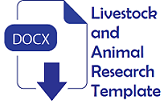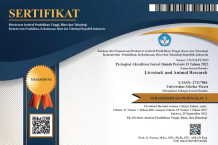The influence of objective and subjective knowledge on attitude and willingness to pay veterinary control number-certified livestock food product
Abstract
Objective: This study aims to analyse the effect of objective and subjective knowledge on attitude and willingness to pay for veterinary control number certified-livestock food products.
Methods: The study was conducted by survey design. Respondents were determined by a judgmental sampling method with the criteria that respondents were at least 19 years old and contribute as full or part decision makers of food buying for him/herself or their families. Data were collected online by using questionnaires and analyzed using structural equation modelling with partial least squares software.
Results: The results showed that objective knowledge (β=0.20, t=1.97) positively affected attitude toward VCN-certified livestock food product, while subjective knowledge did not affect (β= -0.10; t=1.44). Then, attitude toward VCN-certified livestock food product (β=0.29; t=3.73) affected willingness to pay for VCN-certified livestock food product. Furthermore, willingness to pay was influenced directly by subjective knowledge (β=0.34; t=6.37) but objective knowledge was not influenced significantly (β=-0.07; t=1.26). The R2 value for attitude toward VCN-certified livestock food product was 0.05 and willingness to pay was 0.18.
Conclusions: This study concluded that willingness to pay for VCN-certified livestock food product is directly influenced by subjective knowledge, and indirectly by objective knowledge through attitude toward VCN-certified livestock food product.
Keywords
Full Text:
PDFReferences
- Ab Talib, M. S., A. B. Abdul Hamid, and T. Ai Chin. 2015. Motivations and limitations in implementing Halal food certification: a Pareto analysis. British Food Journal. 117:2664–2705. doi:10.1108/BFJ-02-2015-0055.
- Aidoo, R., and I. Fromm. 2015. Willingness to Adopt Certifications and Sustainable Production Methods among Small-Scale Cocoa Farmers in the Ashanti Region of Ghana. J Sustain Dev. 8. doi:10.5539/jsd.v8n1p33.
- Borda, D., O. A. Mihalache, L. Dumitraşcu, D. Gafițianu, and A. I. Nicolau. 2021. Romanian consumers’ food safety knowledge, awareness on certified labelled food and trust in information sources. Food Control. 120:107544. doi:10.1016/j.foodcont.2020.107544.
- Dang, T. N. H., and K. K. Phanasan. 2020. The Influence of Corporate Social Responsibility on Brand Trustworthiness, Perceived Brand Quality, Brand Attitude and Purchase Intentions: The Case of a Leading Vietnamese Sausage Manufacturer.
- Djukic, D., S. Veskovic Moracanin, M. Milijasevic, J. Babic, N. Memisi, and L. Mandic. 2020. Food Safety and Food Sanitation. Journal of Hygienic Engineering and Design. 7:25–31.
- Dube, J.-P., Z. Fang, N. M. Fong, and X. Luo. 2015. Competitive Price Targeting. SSRN Electronic Journal. doi:10.2139/ssrn.2694320.
- Homburg, C., N. Koschate, and W. D. Hoyer. 2005. Do Satisfied Customers Really Pay More? A Study of the Relationship between Customer Satisfaction and Willingness to Pay. J Mark. 69:84–96. doi:10.1509/jmkg.69.2.84.60760.
- Jain, R. 2017. Basic Branding Concepts: Brand Identity, Brand Image and Brand Equity. International Journal of Sales & Marketing Management Research and Development. 7:1–8. doi:10.24247/ijsmmrdaug20171.
- Jaung, W., G. Q. Bull, U. R. Sumaila, Markum, and L. Putzel. 2018. Estimating water user demand for certification of forest watershed services. J Environ Manage. 212:469–478. doi:10.1016/j.jenvman.2018.02.042.
- Kendall, H., B. Clark, C. Rhymer, S. Kuznesof, J. Hajslova, M. Tomaniova, P. Brereton, and L. Frewer. 2019. A systematic review of consumer perceptions of food fraud and authenticity: A European perspective. Trends Food Sci Technol. 94:79–90. doi:10.1016/j.tifs.2019.10.005.
- Kovačević, T., and M. Japundžić. 2014. Certification and Control of Organic Agriculture. In: Economy of eastern Croatia yesterday, today, tommorow.
- Lanfranchi, M., E. Schimmenti, M. G. Campolo, and C. Giannetto. 2019. The willingness to pay of Sicilian consumers for a wine obtained with sustainable production method: An estimate through an ordered probit sample-selection model. Wine Economics and Policy. 8:203–215. doi:10.1016/j.wep.2019.11.001.
- Maitiniyazi, S., and M. Canavari. 2021. Understanding Chinese consumers’ safety perceptions of dairy products: a qualitative study. British Food Journal. 123:1837–1852. doi:10.1108/BFJ-04-2019-0252.
- Meijaard, E., S. Wunder, M. R. Guariguata, and D. Sheil. 2014. What scope for certifying forest ecosystem services? Ecosyst Serv. 7:160–166. doi:10.1016/j.ecoser.2013.12.008.
- Moksony, F. 1999. Small Is Beautiful: The Use and Interpretation of R2 in Social Research. Available from: https://www.researchgate.net/publication/242329609
- Nocella, G., L. Hubbard, and R. Scarpa. 2010. Farm Animal Welfare, Consumer Willingness to Pay, and Trust: Results of a Cross‐National Survey. Appl Econ Perspect Policy. 32:275–297. doi:10.1093/aepp/ppp009.
- Philippe, A., and P.-V. Ngobo. 1999. Assessment of Consumer Knowledge and Its Consequences: a Multi-Component Approach. Advances in Consumer Research. 26:569–575.
- Saraithong, W. 2016. Estimating Willingness to Pay for Safe Beef. Journal of Environmental Management and Tourism. 7:94–104.
- Setiyaningrum, A., K. L. Batu, and Andriyansah. 2019. What triggers the purchase of green products in Indonesia? Quality - Access to Success. 20:136–142.
- Shidiq, R. M., and T. A. Ramli. 2019. Kepemilikan Sertifikat Nomor Kontrol Veteriner Pada Pelaku Usaha Pangan Asal Hewan dalam Rangka Perlindungan Konsumen dihubungkan dengan Permentan Nomor. 381/Kpts/Ot-140/10/2005 tentang Sertifikasi NKV Unit Usaha Pangan Asal Hewan . In: Prosiding Ilmu Hukum. UNISBA, Bandung. p. 1068–1075.
- Silalahi, S. A. F., F. Fachrurazi, and A. M. Fahham. 2022. Factors affecting intention to adopt halal practices: case study of Indonesian small and medium enterprises. Journal of Islamic Marketing. 13:1244–1263. doi:10.1108/JIMA-05-2020-0152.
- Skripnuk, D. F., V. A. Davydenko, G. F. Romashkina, and R. R. Khuziakhmetov. 2021. Consumer Trust in Quality and Safety of Food Products in Western Siberia. Agronomy. 11:257. doi:10.3390/agronomy11020257.
- Sudarmiatin, S., F. Khoirul Anam, and V. Wafaretta. 2020. The Intention of Halal Certification by Micro Business. KnE Social Sciences. doi:10.18502/kss.v4i9.7322.
- Suryana, E. A., D. Martianto, and Y. F. Baliwati. 2019. Pola Konsumsi dan Permintaan Pangan Sumber Protein Hewani di Provinsi Nusa Tenggara Barat dan Nusa Tenggara Timur. Analisis Kebijakan Pertanian. 17:1. doi:10.21082/akp.v17n1.2019.1-12.
- Thongpalad, K., J. K. M. Kuwornu, A. Datta, S. Chulakasian, and A. K. Anal. 2019. On-farm food safety knowledge, attitudes and self-reported practices of layer hen farmers. British Food Journal. 121:1912–1925. doi:10.1108/BFJ-12-2018-0799.
- Verbeke, W., P. Rutsaert, K. Bonne, and I. Vermeir. 2013. Credence quality coordination and consumers’ willingness-to-pay for certified halal labelled meat. Meat Sci. 95:790–797. doi:10.1016/j.meatsci.2013.04.042.
- Verbeke, W., and I. Vackier. 2004. Profile and effects of consumer involvement in fresh meat. Meat Sci. 67:159–168. doi:10.1016/j.meatsci.2003.09.017.
- Wang, J., J. Tao, and M. Chu. 2020. Behind the label: Chinese consumers’ trust in food certification and the effect of perceived quality on purchase intention. Food Control. 108:106825. doi:10.1016/j.foodcont.2019.106825.
- Wongprawmas, R., and M. Canavari. 2017. Consumers’ willingness-to-pay for food safety labels in an emerging market: The case of fresh produce in Thailand. Food Policy. 69:25–34. doi:10.1016/j.foodpol.2017.03.004.
- World Bank. 2023. GDP growth (annual %) - Indonesia. Available from: https://data.worldbank.org/indicator/NY.GDP.MKTP.KD.ZG?locations=ID
- Zumaroh, I. A. 2019. The Comparison Of Consumer Decision Making Process For Halal Food In Indonesia : Case Study At Minority And Majority Muslims Area In Indonesia. ACTIVA: Jurnal Ekonomi Syariah . 2:116–131.
Refbacks
- There are currently no refbacks.










